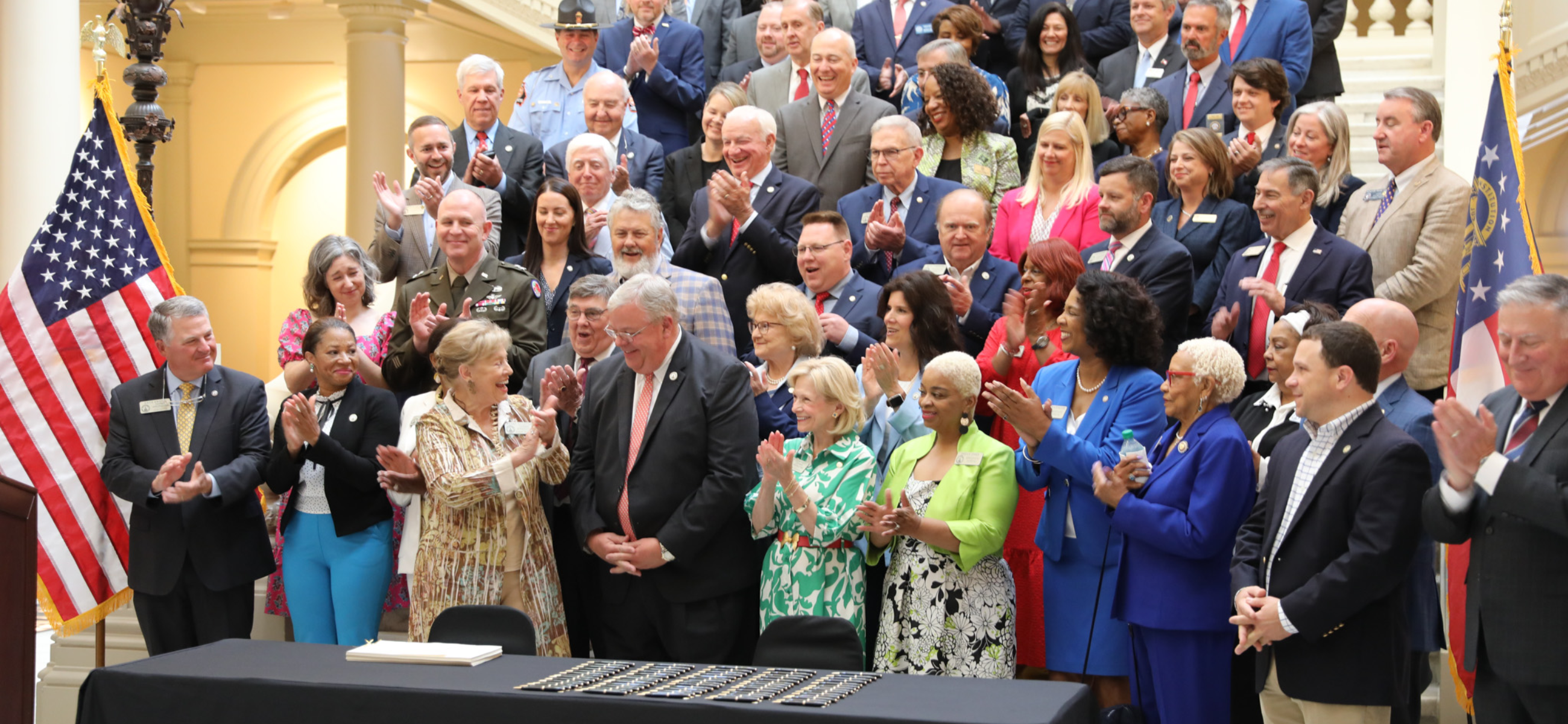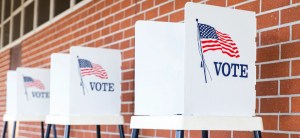Stay ahead of the curve as a political insider with deep policy analysis, daily briefings and policy-shaping tools.
Request a DemoKemp signs a bevy of bills on elections, public safety and workforce development

Legislators celebrate the signing of legislation enacting the fiscal year 2025 budget at the Capitol on May 7, 2024. (Credit: Georgia House)
The Gist
Gov. Brian Kemp on Tuesday ended a six-week whirlwind statewide bill-signing tour that enacted hundreds of new laws governing agriculture, families, elections, public safety and workforce development.
He also vetoed a dozen bills — including those dealing with homestead exemptions and easing eligibility for the HOPE Scholarship for former foster youths — during that time.
What’s Happening
All told, Kemp signed 709 bills into law in the 40 days since the 2024 legislative session ended in the early hours of March 29. The most crucial piece of legislation, by far, was the $36.1 billion fiscal year 2025 state budget, which included 12 disregards. A disregard is when a state agency is directed not to spend the money allocated for a specific item.
“He didn’t have any real disregards. The majority of these are clarifications,” Kemp spokesman Garrison Douglas said of the governor. “Agencies were given more specific instructions on how to spend the money.”
Bills impacting education, health care, military members, human trafficking and Georgia’s coastal communities were among those Kemp signed in the month following the session’s end. Other notable legislation:
- Police and property owners now have more tools to remove squatters, people who have illegally taken over a private home or property.
- Homeowners associations are now required to notify homeowners in writing of a covenant breach and give them time to fix it before the HOAs take legal action.
- Families of students in low-performing school districts may now receive scholarships, commonly referred to as vouchers, of $6,500 per child to be used for private school tuition or homeschooling expenses.
Additional legislation the governor signed over the last two weeks includes:
Agriculture

- Kemp signed a package of bills meant to provide further protection for the state’s No. 1 industry. The new laws are intended to ban “adversarial” countries from owning Georgia farmland, ease high input costs for farmers, protect children from misleading and dangerous marketing, and hike penalties for livestock theft.
Children & Families
- Senate Bill 376 improves timely permanent placement of a child removed from his or her home by the Georgia Division of Family and Children Services.
- Senate Bill 387 provides free state identification cards for children between the ages of 14 and 17 who are in the custody of the Division of Family and Children Services.
Elections

Any Georgia resident can now challenge another resident’s voter eligibility under a new law the governor signed in April, setting up probable cause to have voters removed from the rolls, critics say. Senate Bill 189 also allows a presidential candidate from any political party to be on the ballot as long as that person qualifies in at least 20 other states. It’s one in a package of election-related bills that critics say could impact the outcome of the 2024 and other future elections.
- House Bill 974 gives the public online access to photos of ballots cast in elections on the Georgia Secretary of State’s website, requires watermarks on ballots and uses technology to verify the text on ballots cast. The bill also requires a percentage of ballots in select statewide elections to be audited.
- House Bill 1207 gives election supervisors the flexibility to change the number of voting booths in precincts.
Public Safety
- House Bill 1105, the Georgia Criminal Alien Track and Report Act, creates a new immigration law that requires law enforcement to determine the nationality and immigration status of people they detain and requires the Department of Corrections and sheriffs to notify federal authorities when they have undocumented immigrants in their custody. Failure to enforce the law could cause local governments to lose state and federal funds, and law enforcement officers and government officials could face misdemeanor charges.
- Senate Bill 63 adds 30 more criminal charges to those requiring cash bail for release, including 18 misdemeanors, such as criminal trespass, forgery and failure to appear. The bill also limits what charitable organizations can do to provide bail to people in jail and establishes that individuals and organizations cannot post more than three cash bonds per year to secure a person’s release. Legal defense organizations say it unfairly limits their work and violates the rights of those accused, and they plan to sue the state to overturn the law.
- Senate Bill 465 creates a new type of offense — felony aggravated involuntary manslaughter — for selling fentanyl to someone who dies from taking the potent drug. Dealers could be prosecuted under the new law whether or not they knew the drug they sold contained fentanyl. Penalties range from a minimum of 10 years to 30 years or life imprisonment.
Workforce Development
Several bills were enacted to help students take advantage of dual enrollment and technical education programs, especially those in high-demand career fields.

- House Bill 982 directs the State Workforce Development Board to create the High-Demand Career List. Colleges, technical schools and high schools currently use conflicting lists, so this unified list will eliminate confusion among students, parents, educators and agencies about what careers are considered high-demand.
- Senate Bill 440 creates the Accelerated Career Diploma Program and simplifies the pathway for students to receive dual enrollment funding for more than 30 hours.
- Senate Bill 497 expands the apprenticeship programs in high-demand career fields and creates a pilot program for public service career apprenticeships.
The Legislature considered more than a dozen bills related to occupational licensing. Among those that passed:
- Senate Bill 354 removes the licensure requirement for beauticians who blow-dry hair, wash hair or apply makeup. The bill doesn’t include other services, such as cutting hair, applying dyes, bleaching or using chemicals, which will still require a cosmetology or esthetician license.
- Senate Bill 373, requires the Board of Marriage and Family Therapists to issue an expedited license to any individual moving from another state who has a current valid license to practice in that state and is in good standing with that state.
- Senate Bill 195 makes Georgia the third state to join the Social Work Licensure Compact. Once seven states have joined, the compact will become functional and allow social workers with valid licenses in good standing to practice in member states.
View Kemp’s 2024 signed legislation here.
Here are some of the bills Kemp vetoed:
House Bill 1231 would have expanded the Georgia Tuition Equalization Grant (TEG) Program, HOPE Scholarship and Dual Enrollment Program eligibility for certainprivate, nonprofit institutions; allowed HOPE Scholarship recipients to use unusedcredit hours to get a first professional degree; and removed the initial and first-year achievement standards of the HOPE Scholarship for former foster youths. Kemp said he vetoed the bill because none of the three proposals were accompanied by additional funding or fiscal analysis.
Senate Bill 368 would have prohibited foreign nationals from making political contributions, which is already banned by federal law. Kemp vetoed the bill at the request of the bill’s sponsor, Sen. Rick Williams, R-Milledgeville.
House Bill 1019, as originally introduced, would have doubled the statewide homestead tax exemption to $4,000 from $2,000 if voters approved it in a referendum. But on the last day of the legislative session, the Senate adopted a floor amendment to return the bill to its original form. That amendment did not change the language of the constitutionally required voter referendum, which references a $10,000 exemption. Voters would therefore be approving a different exemption, which the Legislature did not pass. Conflict between the statutory and the referendum language led Kemp to veto the bill.
See the governor’s statements on all the bills he vetoed here.
What’s Next?
Most of the new laws took effect upon signing or will take effect July 1 unless otherwise noted.
Read these related stories:
Have questions or comments? Contact Jill Jordan Sieder on X @journalistajill or at [email protected] and Tammy Joyner on X @lvjoyner or at [email protected].
And subscribe to State Affairs so you do not miss an update.
Professionals still face licensing delays amid state’s transition to online system
The Gist Georgia’s professionals and business owners are still struggling to obtain professional licenses in a timely manner. As the Secretary of State’s Office rolls out its new Georgia Online Application Licensing System to expedite the process, the efficiency of this new process is being put to the test. What’s Happening Thursday morning at the …
Controversy over AP African American Studies class grows
Rashad Brown has been teaching Advanced Placement African American Studies at Atlanta’s Maynard Jackson High School for three years. He’ll continue to do so — even though the state’s top education official removed it from the list of state-funded course offerings for the upcoming school year. While Brown prepares to start teaching his class on …
Students, teachers, lawmakers blast decision to end AP African American history classes
ATLANTA — A coalition of lawmakers, civil rights leaders, clergy, educators and students Wednesday called on the state’s education czar to rescind his decision to drop an advanced placement African American studies class from the state’s curriculum for the upcoming school year. “This decision is the latest attack in a long-running GOP assault on Georgia’s …
Kamala Harris’ presidential bid reinvigorates Georgia Democrats
Georgia Democrats have gained new momentum heading into the November election, propelled by President Joe Biden’s decision to bow out of his reelection bid and hand the reins to Vice President Kamala Harris. The historic decision, announced Sunday, is expected to prove pivotal in the national and state political arenas and breathe new life and …



